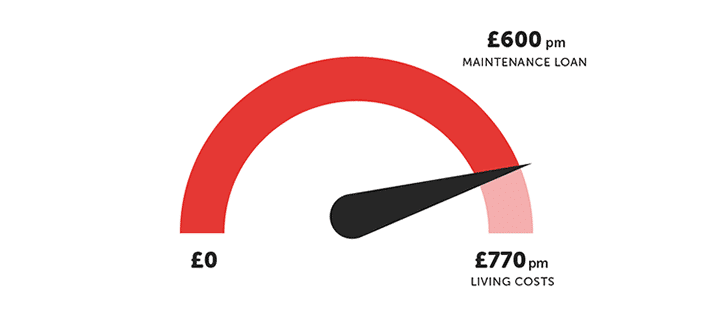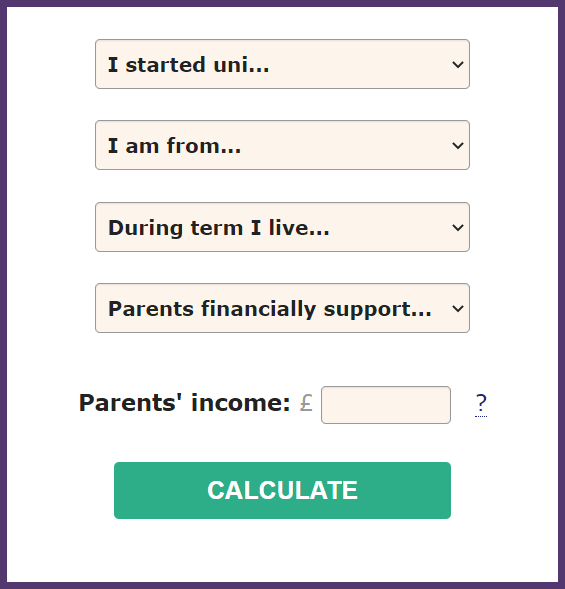There's a high chance you're going to need some help from the Bank
of Mum and Dad at university. Here's how much they're expected to
contribute...
 Since the current maintenance loan is often nowhere near enough to cover current living costs in
the UK, the government expect parents to pick up the shortfall.
Basically, the more they earn, the more they're expected to contribute.
Since the current maintenance loan is often nowhere near enough to cover current living costs in
the UK, the government expect parents to pick up the shortfall.
Basically, the more they earn, the more they're expected to contribute.
Depending on where you live at uni and how much your parents earn, they could be expected to contribute over £4,000 a year! According to our 2018 survey, the average student receives £138.50 a month from parents.
Read on to find out exactly how much your parents should be contributing and how you can go about asking them for it...
 The current student finance system uses your parents' income to determine how much money you get to live off while you're studying - this means it's means-tested.
The current student finance system uses your parents' income to determine how much money you get to live off while you're studying - this means it's means-tested.
Whether this is fair or not is debatable. For starters, the system fails to take into account that some parents will also be supporting other children at university which will strain their income.
Some parents will also have different attitudes to this than others - some might think that because you're 18 (and they're technically no longer legally responsible for you), that it's up to you to fund yourself, while others might be more than willing to dish out the cash.
On the other hand, many students will have parents on lower incomes who simply aren't in a position to support them financially at all, so the government has created a system which tries to ensure these students can still access higher education.
However, after scrapping maintenance grants, students with bigger loans will now also graduate with more debt than others - again, something which isn't very fair.
Basically, even if you think your parents can't afford to give you all the money you need, or they're not willing to, our current student finance system works on the presumption that they're going to help you out financially - so unless that changes, it's a conversation you're probably going to have to have.
There's no easy answer to this, as it really depends on your individual financial circumstances, your parents' generosity and factors such as how much rent you're paying.
However, as a bit of guidance, we've developed a calculator showing what your parents are 'expected' to contribute each year:

Disclaimer: Please be aware that these are simply suggested parental contributions, that should be used as a guide only.
These figures are based on the fact that, the more your parents' earn, the smaller your maintenance loan will be - and the larger the shortfall your parents will have to cover.
The table below gives you a breakdown of the amount of maintenance loan you'll receive, plus the expected parental contribution.
Note: This table only applies to students who started uni in or after 2016, and who are living away from home but outside of London. If this isn't you, check out our Big Fat Guide to Student Finance for more maintenance loan figures.
The amounts above were calculated on the assumption that parents who earn below £25,000 won't be contributing.
As you can see, all values add up to £8,700 - students from households with the lowest household income will have this all covered by loans, whereas students from higher income backgrounds will receive a smaller loan and will therefore need to use parental contributions to reach that same number.
Since these students receive £8,700 a year, the logic is that parents with higher incomes will be expected to make up the rest to ensure all students are receiving the same or a similar amount.
If you're worried about how to broach the subject, we've come up with four top tips that will make the whole process much easier (and your chances of actually getting the green light much higher!).
 At the end of the day, there are many families out there who won't be
in a position to provide extra cash to top up the maintenance loan -
and similarly, there will be parents who just won't.
At the end of the day, there are many families out there who won't be
in a position to provide extra cash to top up the maintenance loan -
and similarly, there will be parents who just won't.
This isn't a great situation to be in, and is a major flaw in the UK's student finance system - something which Save the Student is actively seeking to change.
But in the meantime, if you're struggling for the funds you need to support yourself at university, here's a quick list of other avenues you can explore to try and top up your income:

Credit: Dreamworks
Depending on where you live at uni and how much your parents earn, they could be expected to contribute over £4,000 a year! According to our 2018 survey, the average student receives £138.50 a month from parents.
Read on to find out exactly how much your parents should be contributing and how you can go about asking them for it...
What’s on this page?
- Should your parents give you money at university?
- How much money 'should' your parents give you?
- How to ask your parents for money
- What should you do if your parents don't give you money?
Should your parents give you money at university?

The Maintenance Loan is on average £170 short each month - National Student Money Survey 2018
Whether this is fair or not is debatable. For starters, the system fails to take into account that some parents will also be supporting other children at university which will strain their income.
Some parents will also have different attitudes to this than others - some might think that because you're 18 (and they're technically no longer legally responsible for you), that it's up to you to fund yourself, while others might be more than willing to dish out the cash.
On the other hand, many students will have parents on lower incomes who simply aren't in a position to support them financially at all, so the government has created a system which tries to ensure these students can still access higher education.
However, after scrapping maintenance grants, students with bigger loans will now also graduate with more debt than others - again, something which isn't very fair.
Basically, even if you think your parents can't afford to give you all the money you need, or they're not willing to, our current student finance system works on the presumption that they're going to help you out financially - so unless that changes, it's a conversation you're probably going to have to have.
We should probably also point out that even if you receive the maximum maintenance loan
- the loan which assumes your parents won't be able to support you -
this still might not be enough to cover all your living costs. Check out
our alternative funding sources for ideas of where to seek extra financial support.
How much money 'should' your parents contribute?
Every week we receive emails from students asking how much their parents should contribute towards their living costs.There's no easy answer to this, as it really depends on your individual financial circumstances, your parents' generosity and factors such as how much rent you're paying.
However, as a bit of guidance, we've developed a calculator showing what your parents are 'expected' to contribute each year:

Disclaimer: Please be aware that these are simply suggested parental contributions, that should be used as a guide only.
These figures are based on the fact that, the more your parents' earn, the smaller your maintenance loan will be - and the larger the shortfall your parents will have to cover.
The table below gives you a breakdown of the amount of maintenance loan you'll receive, plus the expected parental contribution.
Note: This table only applies to students who started uni in or after 2016, and who are living away from home but outside of London. If this isn't you, check out our Big Fat Guide to Student Finance for more maintenance loan figures.
The amounts above were calculated on the assumption that parents who earn below £25,000 won't be contributing.
As you can see, all values add up to £8,700 - students from households with the lowest household income will have this all covered by loans, whereas students from higher income backgrounds will receive a smaller loan and will therefore need to use parental contributions to reach that same number.
Since these students receive £8,700 a year, the logic is that parents with higher incomes will be expected to make up the rest to ensure all students are receiving the same or a similar amount.
If your parents want to read up on how Student Finance works and how much money they might need to give you, our parents' guide to university has everything they need to know.
How to ask your parents for money
Once you've worked out exactly how much money you're going to need from your parents to get by at university, you'll need to sit them down and talk about it.If you're worried about how to broach the subject, we've come up with four top tips that will make the whole process much easier (and your chances of actually getting the green light much higher!).
-
Show them you're taking uni seriously
Your parents might have some reservations about whether giving you money for uni is a good investment or not. They want to know that you're going to university to study hard, get good grades and ultimately get a job after graduation. Credit: 20th Century Fox
Credit: 20th Century Fox
Show them that you're not just going to uni for the nights out - talk about particular modules you're looking forward to, any pre-reading you're doing or plans for the future.
They'll see that you're taking university seriously, and you're committed to making the most of your time there - and that ultimately, it will be a worthwhile investment. -
Impress them with a budget
If you just ask your parents for a large sum of money, without actually explaining what it's going to be used for, they might be a bit hesitant. Credit: Warner Bros Pictures
Credit: Warner Bros Pictures
Instead, show them that you've thought carefully about your outgoings each week/month, and have it all written down clearly for them to see.
Use the table above as a starting point and check our guide to budgeting to break it all down in to individual expenses.
Ultimately, if you can give them an exact figure, with a clear idea of where that money is going, they'll be more likely to give you some help than if you just ask for 'some money'. -
Back it up with research
A budget is one thing, but if you can go one step further and back it up with some solid research on the best deals, they'll likely be even more impressed. Credit: Pemberley Digital
Credit: Pemberley Digital
Luckily for you, Save the Student is packed full of useful guides and inside tips on how to save money at uni - check out our guide to the best value broadband packages or 57 ways to save money on food.
This shows you haven't just calculated how much things are going to cost at uni, but you've also looked at how you're going to keep those costs down, ultimately saving your parents money. -
Be prepared to compromise
They'll likely appreciate it if you show that you don't just expect everything to be handed to you, and you're prepared to put in some work too. Credit: BBC
Credit: BBC
Try and scout out some part-time jobs you could do alongside your studies, or start setting up a crafty side-hustle to earn some extra cash.
A part-time job probably won't provide you with enough money to make up the maintenance loan shortfall, but it will help and give you some financial independence while you study.
What should you do if your parents don't give you money?

Credit: BBC
This isn't a great situation to be in, and is a major flaw in the UK's student finance system - something which Save the Student is actively seeking to change.
But in the meantime, if you're struggling for the funds you need to support yourself at university, here's a quick list of other avenues you can explore to try and top up your income:
- There are loads of grants, scholarships and bursaries out there, with a range of weird and quirky criteria in many cases. Do some thorough research to see if there are any suitable for you
- Get a part-time job - Loads of students get part-time jobs at uni, and they're a crucial way of boosting your income. You could also try freelancing if you want the extra flexibility
- Try setting up a side-hustle or your own business. These take some serious hard work and dedication, but could be a great way of combining your passion with a bit of money-making
- Find out about university hardship funds - these are available for students who are struggling financially. Your student advice centre should have more information on this
- Take a gap year to work full-time and save up some more money. You might be keen to get to uni, but you can easily defer your place for a year if you need more time to save.
Don't forget to use our parental contributions calculator to see how much your parents might need to give you, and don't get caught out by any student finance myths!
Do you think it's fair that parents are expected to
contribute to students' living allowance at university? Let us know your
thoughts!

No comments:
Post a Comment
Thanks for reading and dropping your comment.
We will reply you ASAP